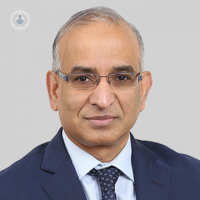An in depth discussion about knee replacement: part 2
Escrito por:In the second article of a two-part series, consultant trauma and orthopaedic surgeon Mr Tarique Parwez discusses the complications linked to knee replacement surgery, as well as recommendations for recovery.
What are the most common post-operative complications associated with the knee replacement surgery?
Depending on each individual case, some complications can be common but less serious, while there are complications which are less common but more serious.

Before undergoing surgery, the surgeon will give the patient information about the potential risks and rewards of surgery, as well as the complications.
I always tell my patients about the most common risk in practice, which is the formation of a clot in the leg which can go to the lungs. For this reason, doctors emphasise that the patient should get up and about as soon as possible after the surgery, because it is the best possible defense against clot formation.
Deep vein thrombosis
The reason for sending patients home quickly after surgery is that it leads to a reduced risk of developing deep vein thrombosis , less swelling, pain, infection and fewer complications; early motion is the key.
Following surgery, we will give patients head stockings and tight socks to wear, as well as a blood thinner to prevent the occurrence of DVT.
For a crucial knee replacement, patients will be given aspirin or another stronger blood thinner, which will usually need to be taken for two weeks. For those who have a family history of DVT, it will be essential to take it for longer.
Residual pain
It is common for patients to suffer residual pain after knee replacement surgery. They will be offered painkillers to take the edge of the pain so that they don't lose their balance and are still able to participate in physiotherapy.
Stiffness
If patients don't move significantly in the first few weeks after surgery, they may experience stiffness. Physiotherapy is essential to get the knee moving.
Infection
Infection is rare but still a possibility. However, only around 1 in 200 patients suffer from infection, or in the independent sector, the figure is 1 in 400-500 patients, therefore it is not something that patients should worry too much about.
Blood clots
One serious complication linked to knee replacement is blood clots. As previously mentioned, early movement is essential in order to minimise the risk of this occurring.
In general, patients have positive results following the surgery. Due to the nature of the surgery, patients can feel some discomfort and the wound produced can take a little bit more than two weeks to heal.
What recommendations do you have for patients to accomplish a successful recovery after knee replacement surgery?
I have a number of recommendations for post-surgery recovery.
The first thing that I recommend to patients is what I refer to as physical and mental preparation or pre-habilitation. Before undergoing a knee replacement, you must ensure that you do not have any ongoing infection, or any cuts or grazes on the knee. You must be infection-free
You can also do exercises without moving the knee, such as static quads and hamstring exercises or use a bike to keep the soft tissue moving and the knee mobile.
Additionally, getting in the water is a good idea because exercise such as swimming can strengthen the knee. It is important to exercise to strengthen and move the muscles around the knee and maintain endurance. This helps the muscles recover faster post-surgery, called pre-habilitation.
In some areas of the UK, a ´pre-knee school´ is available. Patients can attend this school, where they are given exercises to do which help to prepare physically and mentally for surgery. They can also meet people who have undergone knee replacement and ask them questions which they cannot ask the surgeon. This experience helps patients to establish realistic expectation levels for the surgery.
What is the outcome like?
The outcome of surgery can depend on your perspective and expectations. Unfortunately, if you expect to be 100% better, you will be disappointed but if you set your expectations to be more realistic, for example, to be 75%-80% better, then you will be happy. I always have discussions with patients to make sure their expectations are at a realistic level.
It is also recommended that you prepare well for post-operative care. It is best to establish a support system for the first two weeks, such as a person who can come and support you in your daily tasks post-surgery.
In addition, it is essential to try and get moving as soon as possible after surgery, therefore you should have some knowledge of exercises you can do after the surgery.
The aim for each patient is to be able to walk a mile 6 weeks post-surgery. This will not work if the patient does not make the effort to exercise the knee. If they do exercise the knee, they will reap the benefits of their labour.
If you are considering having knee replacement surgery and would like to book a consultation with Mr Parwez, do not hesitate to do so by visiting his Top Doctors profile today.


